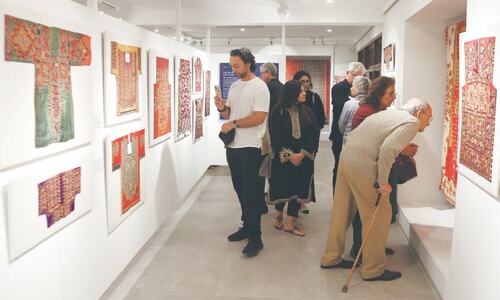KARACHI, Feb 11: A plan is in the works to establish a tax-free industrial zone in the interior of Sindh to give a boost to economic activity, where interested parties will be given possession of the land on 10 per cent payment, with the remaining amount payable in multiple instalments.
Provincial Industries Minister Abdul Rauf Siddiqui stated this on the floor of the Sindh Assembly when a lawmaker had asked him about establishing a tax-free zone in the province during question hour in Wednesday’s session.
The minister added that this tax-free status would be applicable for 10 years and that both the president and the prime minister had given him positive feedback about the proposal.
The issue of tax-free zones had risen as a supplementary question to Arif Mustafa Jatoi’s query about the number of industrial plots in Karachi’s Sindh Industrial Trading Estate (Site) approved for bifurcation/subdivision into smaller pieces by their owners between Jan 1, 2007 and June 30, 2008.
Mr Siddiqui had said in his written reply to the National People’s Party lawmaker’s question that the details had been placed on the table of the house.
Question hour began with much mirth and a bit of poetry, as the industries minister gave the house a display of both his comedic and poetic prowess before answering the first query, also put forth by Arif Jatoi.
Mr Jatoi had asked him if the Sindh government’s sugar mill in Dadu had been sold to a private party, along with the details of the sale if this was indeed the case.
In his written reply, Rauf Siddiqui said the Dadu Sugar Mill had been sold for Rs90 million to a private party (without naming the party) through an official assignee on the orders of the Sindh High Court. He also listed the conditions of the sale.
Arif Jatoi asked the minister if the Sindh cabinet had approved the sale, to which he replied in the affirmative. He added that the mill had been closed for 10-12 years.
As for the liabilities of the sugar mill, Mr Siddiqui said the Sindh government shared the liabilities, adding that the mill’s workers had been absorbed into various departments of the provincial government.
When Syeda Marvi Rashdi of the Pakistan Muslim League-Functional asked why the condition that the mill shall not be dismantled or shifted for at least five years was inserted, the minister replied that this was to ensure that the land was used for its original purpose. “The land mafia had been known to change the (land use) such as turning plots into residential schemes. That’s why the condition was put in place,” he added.
When Arif Jatoi asked if the old growers’ liabilities had been cleared, the industries minister said all genuine growers had been compensated, while if any remained they should contact the industries department.
A lawmaker claimed that liabilities are still outstanding, to which Mr Siddiqui replied that the government would compensate the parties “100 per cent” if they were pointed out.
In reply to another question, the minister said the government was serious about providing jobs to local people. However, if a technically qualified person was not available in the area, they would have to be brought in from the outside. He added that people from Dadu were working in the sugar mill in question, adding that it was producing three million tonnes of sugar annually.
Zareen Majeed of the Muttahida Qaumi Movement asked the minister how many government sugar mills existed in Sindh. Mr Siddiqui replied that out of 32 sugar mills – all privately owned – 28 were functioning while the government was looking into reviving the non-functioning units.
‘A warehousing zone’
As for the bifurcation issue of Site, Arif Jatoi asked why the plots in Site Karachi – Pakistan’s first such zone – had shrunk from being 50 to 100 acres in size to being one to two acres (and even less). “Why has Site turned into a warehousing zone”, the vocal NPP member asked the minister.
Rauf Siddiqui claimed the reason behind this was that over the past three decades or so, industries had shifted out of Karachi to other provinces, where they were getting more facilities.
He said his department was trying to attract foreign investors to Site by setting up a dedicated office in the area, but until the “capital and life threats” were dealt with, investment would not be forthcoming. “When the political and economic environment improves, (the situation) will improve.”
The minister added that the power crisis was another factor crippling Karachi and the province’s industries. “The wheels of industry need to turn 365 days a year.” He suggested that the solution lay in establishing power-based industry zones, but said the Alternative Energy Commission was creating obstacles in this plan as plants of only 50 megawatts could be established, which was insufficient.
At this point the usually quiet Environment and Alternative Energy Minister Askari Taqvi rose to say that there was no such thing as an Alternative Energy Commission. “There is an Alternative Energy Board, which is under the federal government. There are no restrictions on power generation. Electricity is not a federal subject. It is on the Concurrent List. The province can only set up 50MW (facilities)”, Mr Siddiqui’s fellow Muttahida member told the house.
The PPP’s Saleem Khursheed Khokhar had also enquired about details of the YMCA’s Polytechnic institute, to which senior parliamentarian Syed Sardar Ahmed pointed out that most of his supplementary questions related to the education department, and not industries.













































Dear visitor, the comments section is undergoing an overhaul and will return soon.